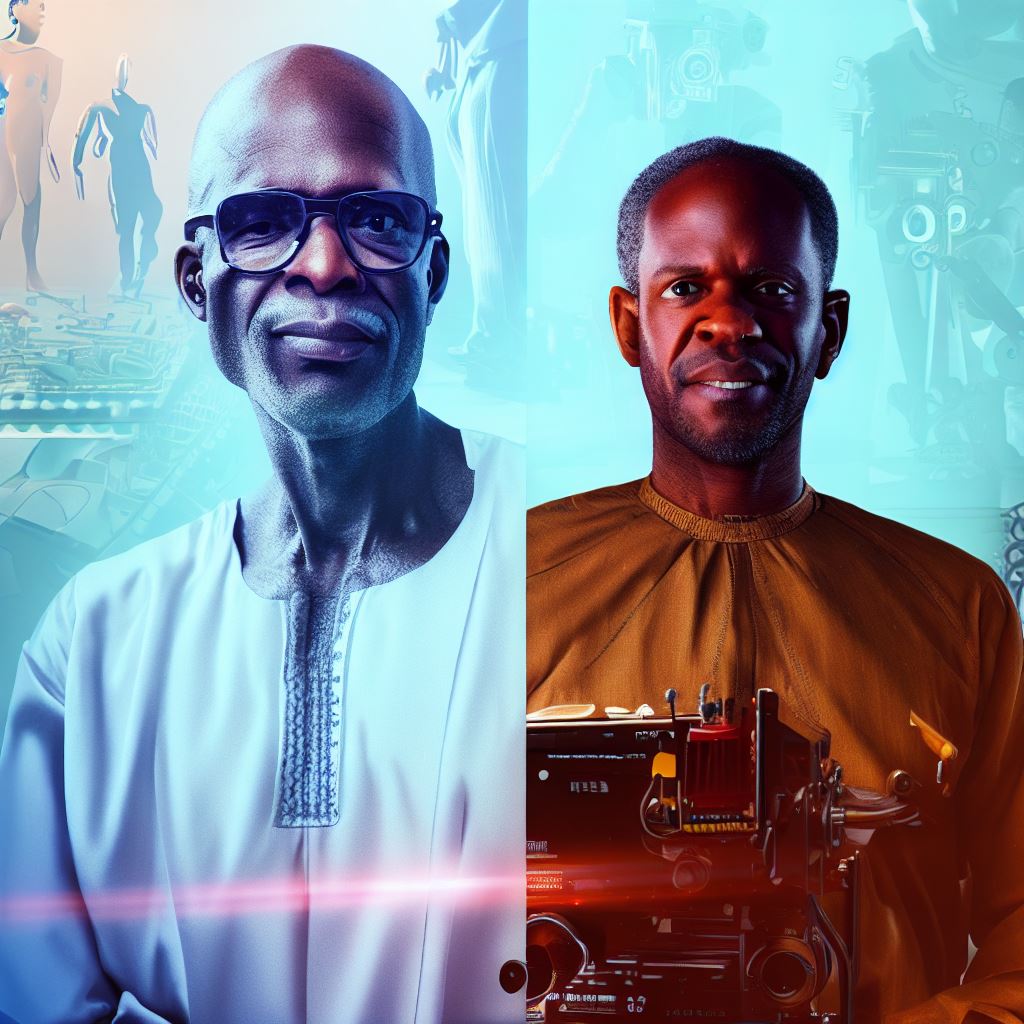Introduction
Let’s explore case atudy: Successful film scores in Nigeria.
Film scores are musical compositions created specifically for movies to enhance emotions and storytelling.
Film scores play a crucial role in movies by creating atmosphere, building tension, and evoking emotions.
The Nigerian film industry, known as Nollywood, is the second-largest in the world, producing numerous films each year.
In the dynamic realm of cinematic expression, music serves as an essential vehicle for storytelling, evoking emotions, and immersing audiences in the narrative.
Within this intricate tapestry, Nigerian film composing has emerged as a vibrant and captivating force, shaping the country’s cinematic landscape with its unique blend of cultural influences and contemporary innovations.
This case study delves into the realm of successful film scores in Nigeria, aiming to unravel the artistic ingenuity and cultural resonance that lie at the heart of these compositions.
Through an in-depth analysis of notable examples, we embark on a journey to understand the intricate interplay between sound and image, and how it contributes to the overall impact and success of Nigerian cinema on both a local and global scale.
By examining the creative processes, influences, and reception of these scores, we hope to shed light on the remarkable achievements of Nigerian composers, showcasing their contributions to the wider cinematic world and underscoring the significance of their work in the broader context of the global film industry.
Significance of Music in Nigerian Films
Exploration of the role of music in Nigerian culture
Music plays a vital role in Nigerian culture, representing traditions, values, and beliefs.
It is deeply embedded in the daily lives of Nigerians, used in ceremonies, festivals, and rituals.
Traditional Nigerian music reflects the diversity of the country, with various ethnic groups having unique styles.
These cultural elements are often incorporated into Nigerian film scores, enhancing the storytelling experience.
Influence of Nigerian music genres on film scores
Nigeria has a rich musical heritage, encompassing genres such as highlife, juju, afrobeat, and Nollywood music.
These genres have evolved over time and have become synonymous with Nigerian identity.
When employed in film scores, they provide a sense of authenticity and familiarity to the audience.
Nigerian music genres infuse the films with energy, creating a unique sonic experience.
Emotional connection and impact of music on storytelling
Music has a powerful impact on emotions, and Nigerian films effectively utilize this aspect.
The melodies, rhythms, and lyrics of the music help convey the characters’ feelings, enhancing their depth.
During intense moments, the music builds tension, keeping the audience engaged and invested in the story.
Similarly, in emotional scenes, the music evokes empathy, intensifying the viewers’ emotional connection to the characters.
By carefully selecting appropriate music, filmmakers establish a strong bond between the audience and the story.
The significance of music in Nigerian films cannot be overstated.
It serves as a cultural representation of Nigerian traditions and beliefs. Moreover, the influence of Nigerian music genres on film scores adds authenticity and energy.
Most importantly, music strengthens the emotional connection between the audience and the characters, enhancing the overall storytelling experience in Nigerian cinema.
Read: Diversity in Nigerian Film Composing: A Closer Look
Case Study: Successful Film Scores in Nigeria
Overview of renowned Nigerian composers in the film industry
Nigeria’s film industry, popularly known as Nollywood, has seen the emergence of talented composers who have made significant contributions to the success of films through their exceptional scores.
These renowned Nigerian composers have achieved both local and international acclaim for their artistry and creativity.
One such composer is Michael “Upgrade” Akinbode, who gained recognition for his outstanding work on the soundtrack of the film “The Wedding Party.”
His ability to blend traditional Nigerian sounds with modern elements resulted in a score that beautifully complemented the romantic-comedy genre of the movie.
Another notable composer is Isobel Jensen.
Her work on the film “Half of a Yellow Sun” showcased her deep understanding of storytelling through music.
The score she created captured the emotions and historical context of the film, immersing the audience in the story’s intensity.
In addition, Kezie Nnamdi Anyaoha, popularly known as KezyKlef, has made a significant impact in the industry.
His work on the film “October 1” received critical acclaim for its ability to transport viewers to the 1960s era.
The score effectively captured the tension and excitement of the thriller, enhancing the overall cinematic experience.
Analysis of popular Nigerian films with remarkable scores
1. “The Wedding Party” (2016) Synopsis and impact of its score
“The Wedding Party” is a romantic comedy that tells the story of a couple’s chaotic wedding planning process.
The film became a huge success, partly due to its remarkable score.
Upgrade’s ability to skillfully blend traditional Nigerian sounds with contemporary beats added an authentic and catchy element to the movie.
The score perfectly captured the lighthearted and joyful essence of the film, resonating with audiences across Nigeria and beyond.
2. “Half of a Yellow Sun” (2013): Synopsis and impact of its score
“Half of a Yellow Sun” is based on the best-selling novel by Chimamanda Ngozi Adichie, depicting the Nigerian-Biafran War.
The film’s score, composed by Isobel Jensen, amplified the emotional impact of the story.
By incorporating traditional Nigerian instruments and melodies, Jensen created a powerful soundtrack that resonated with the film’s themes of love, loss, and resilience.
The score added depth and authenticity, making it an integral part of the film’s success.
3. “October 1” (2014): Synopsis and impact of its score
“October 1” is a psychological thriller set in the pre-independence era of Nigeria.
KezyKlef’s score brilliantly captured the essence of the film, building tension and suspense throughout.
By incorporating traditional Nigerian music elements, such as talking drums and local chants, the score transported viewers to the time period and heightened the overall cinematic experience.
The impactful score played a vital role in immersing the audience in the story’s suspense and creating a lasting impression.
In fact, Nigerian composers in the film industry have played a vital role in the success of films through their exceptional scores.
The work of composers such as Upgrade, Isobel Jensen, and KezyKlef has elevated Nigerian cinema to new heights, delighting audiences both at home and abroad.
The fusion of traditional Nigerian sounds with modern elements has resulted in scores that not only enhance the storytelling process but also showcase the rich cultural heritage of Nigeria.
As the Nigerian film industry continues to grow, these talented composers will undoubtedly play a crucial role in shaping its future success.
Read: Historical Evolution of Film Music in Nigeria

Explore Further: The Joy and Perseverance of Nigerian Circus Performers
Collaboration and Cultural Fusion in Film Scores
Partnerships between Nigerian composers and international talent
- Collaboration between Nigerian composers and international talent has become increasingly common in film scores.
- This partnership allows for the infusion of different cultural elements into the music, creating a unique sound.
- International talent brings their expertise and fresh perspectives, enriching the Nigerian film industry.
- Nigerian composers benefit from the global exposure and recognition that comes with working alongside international artists.
- The collaboration also helps bridge the gap between Nigerian and international audiences, appealing to a wider demographic.
Incorporation of traditional Nigerian instruments in film scores
- Nigerian composers embrace their rich cultural heritage by incorporating traditional instruments in film scores.
- The use of instruments like the talking drum, kora, and shekere adds an authentic and distinct Nigerian flavor to the music.
- These instruments not only enhance the storytelling in films but also serve as a celebration of Nigerian culture.
- By incorporating traditional instruments, Nigerian composers establish a deeper connection between the audience and the film.
Examples of successful cultural fusion in Nigerian film scores
- The film score for “The Figurine” by Nigerian composer, Ade Bantu, brilliantly merges traditional Nigerian sounds with contemporary music.
- The collaboration with German composer, Daniel Sus, infuses elements of Afrobeat, jazz, and classical music.
- The result is a dynamic and captivating score that perfectly complements the visuals and enhances the overall cinematic experience.
- Another example is the film “Half of a Yellow Sun” with a score by Nigerian composer, Keziah Jones.
- Jones seamlessly incorporates Nigerian highlife music and Afrobeat rhythms, creating a nostalgic and emotionally resonant soundtrack.
These successful examples demonstrate the power and beauty of cultural fusion in Nigerian film scores.
In essence, collaboration and cultural fusion play vital roles in the success of film scores in Nigeria.
Partnerships with international talent bring fresh perspectives and global recognition, while the incorporation of traditional Nigerian instruments adds authenticity and cultural richness.
The examples mentioned highlight the success achieved through this fusion of cultures, creating unique soundtracks that capture the essence of Nigerian storytelling.
As the Nigerian film industry continues to grow, collaboration and cultural fusion will undoubtedly remain essential in shaping the future of Nigerian film scores.
Read: The Crossroads of Nigerian Cinema and Music
Influence of Film Scores on Nigerian Music Industry
- Advancement of Nigerian musicians’ careers through film scores.
- Film scores provide Nigerian musicians with opportunities to showcase their talent and gain recognition.
- Collaboration with filmmakers allows musicians to experiment with different styles and genres.
- Successful film scores can lead to increased popularity and fan base for Nigerian musicians.
- The exposure and publicity gained from film scores can open doors to new career opportunities.
- Film scores allow Nigerian musicians to reach a wider audience and expand their fan base.
Increased recognition of Nigerian music globally
- Nigerian film scores have gained international recognition and helped put Nigerian music on the global map.
- The unique Nigerian sound and cultural elements in film scores grab global attention.
- International collaborations in film scoring have exposed Nigerian musicians to a global audience.
- The success of Nigerian film scores has increased interest in the country’s music industry worldwide.
Examples of musicians who emerged from the film scoring industry
- Fela Kuti, the afrobeat legend, got his breakthrough through his music in Nigerian films.
- King Sunny Ade’s collaboration on film scores helped him gain popularity both locally and internationally.
- Niyi Adedokun, a renowned composer, emerged from the film scoring industry and achieved success in the music industry.
- Asa, a Nigerian-French singer, gained recognition through her music features in Nigerian films.
In review, film scores play a significant role in influencing the Nigerian music industry.
They advance the careers of Nigerian musicians by providing opportunities for collaboration and experimentation.
The increased recognition of Nigerian music globally is attributed to the success and uniqueness of film scores.
Musicians like Fela Kuti, King Sunny Ade, Niyi Adedokun, and Asa have emerged from the film scoring industry, reinforcing the positive impact film scores have on the Nigerian music scene.
Read: Guide to Licensing for Film Composers in Nigeria
Conclusion
Film scores play a significant role in the Nigerian cinema industry as they enhance the storytelling and emotional impact of films.
Nigerian film scores have experienced immense success and growth, both domestically and internationally.
Looking ahead, the future prospects for film scores in Nigeria are promising, with opportunities for further innovation and recognition in the global film industry.




